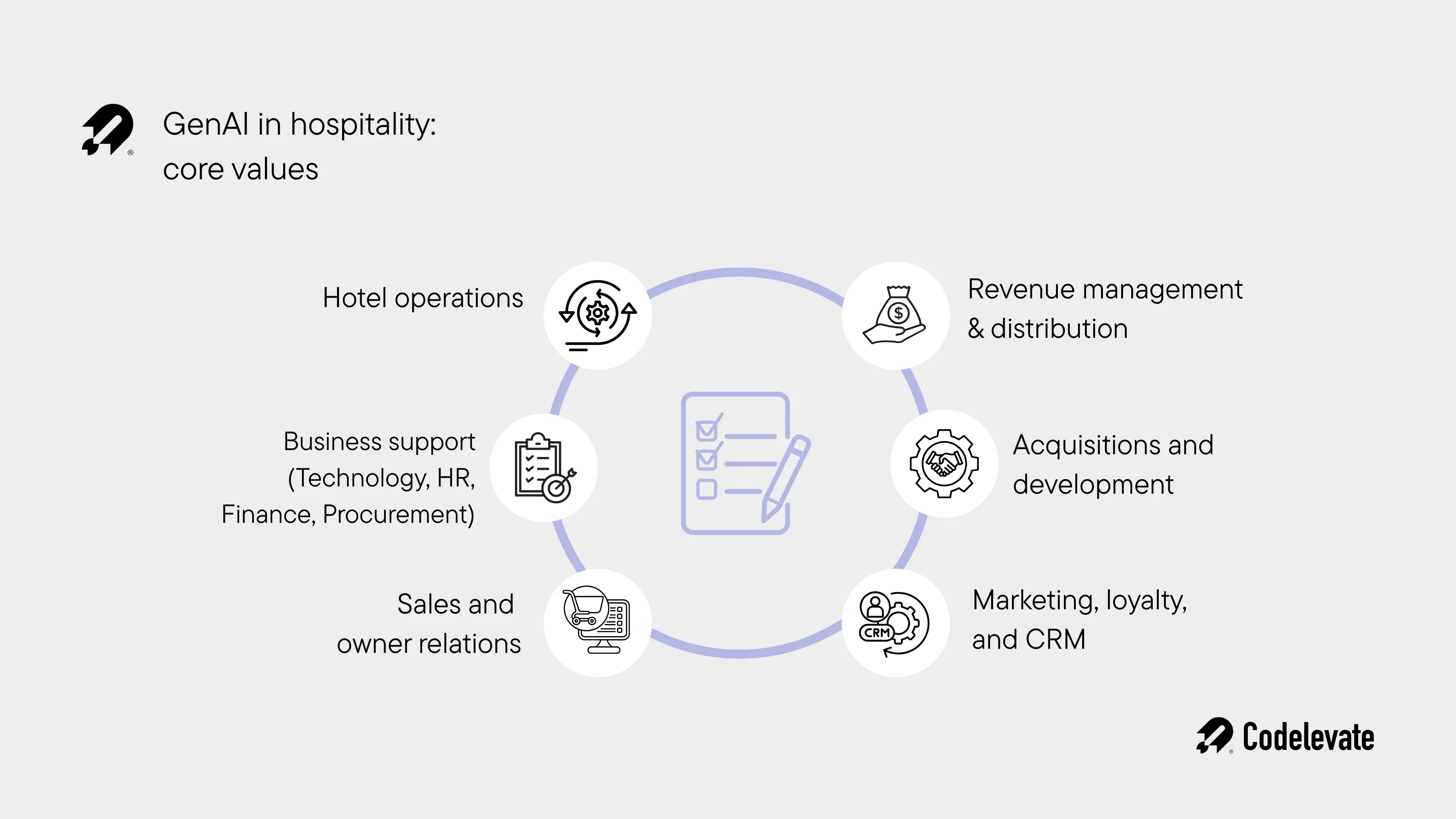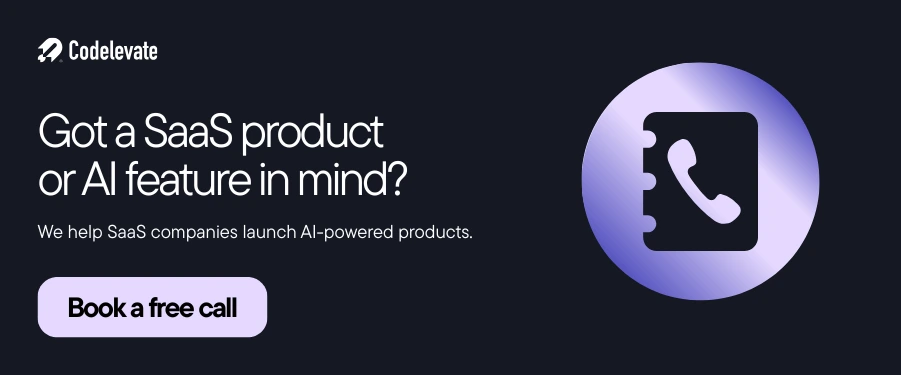How AI is changing the hospitality industry

The hospitality industry is no stranger to change, but the rise of artificial intelligence (AI) is accelerating transformation in ways we couldn’t have imagined just a few years ago. Whether it’s a luxury resort in Las Vegas, a boutique hotel in Tokyo, or a family-run guesthouse in a small town, AI is creating opportunities for better guest experience, smoother operations and smarter business decisions.
In this guide, we explore these AI use cases and highlight how they help hospitality businesses enhance guest experiences while boosting operational efficiency and profitability.
What does AI mean in hospitality?
In hospitality, AI is used across many areas with two main goals: increasing profitability and enhancing guest experiences. Behind the scenes, AI analyzes business data to help hotels make smarter decisions about pricing, cost management, and overall operations. At the front of the house, AI supports staff by automating routine tasks, speeding up services, and personalizing guest interactions. Many hotels also leverage AI to support sustainability efforts, such as reducing waste and optimizing energy use, which not only benefits the environment but also improves the bottom line.
Key takeaways
There are several pressures that are nudging the hospitality sector toward AI adoption:
- Guest expectations are rising: People assume faster service, more personalisation, easier booking and seamless communication.
- Labour shortages and cost pressures: Many hotels struggle with staffing, especially for routine tasks. AI can help fill gaps or assist staff in being more effective.
- Cost control and revenue pressure: As margins tighten, hotels are looking for ways to reduce waste, optimise pricing, occupancy and resources.
- Sustainability goals: Many properties are under pressure to reduce energy, water and food waste, and AI offers tools to help manage those challenges.
- Data overload: Hotels have large volumes of information (guest preferences, occupancy rates, cleaning schedules, equipment usage) and AI helps make sense of it.
Thus, using AI isn’t just a luxury - it’s becoming a necessity for staying competitive and meeting changing guest demands. As one industry survey of 1,500 hotels across six European countries found: while 68% of respondents pointed to reservations as the most useful application of AI, only 41% said they are actually using AI solutions.
What is the value?
AI in hotels helps improve both guest experiences and operations. Chatbots and virtual assistants make customer interactions faster and more personalized. AI also supports smarter pricing, encourages direct bookings, and boosts revenue management. Marketing becomes more effective with personalized campaigns, while back-office tasks like HR, finance, and procurement run more efficiently. Altogether, AI enhances guest satisfaction, increases profitability, and gives hotels a competitive advantage.

Key advantages of AI in hospitality
Here are the main benefits that hotels and other hospitality businesses are seeing when they invest in AI.
Enhanced guest service
AI tools such as chatbots, virtual assistants or voice-activated room systems can respond quickly to guest requests, reduce wait times and give consistent service day and night. For example, AI chatbots handle many routine queries without human staff intervening, freeing people to focus on more complex tasks. According to an industry report, one of the most frequently mentioned advantages among early AI adopters was “time savings” (76%) and “improved communication” (54%). From a guest’s point of view, that means when you message the hotel app at midnight because you forgot your WiFi password or want room service, you don’t wait - AI responds and delivers. And from the hotel’s point of view, staff can focus on welcoming guests rather than answering repetitive questions.
Personalised experiences
Thanks to data analysis, AI can help personalise the guest stay. For instance, it can suggest services, adjust room settings (lighting, temperature), or present tailored offers that match guest preferences. A Deloitte survey found that 52 % of customers believe generative AI will be used for interactions, and 44% expect it to be used for guest engagement. Personalisation at scale means that even a chain hotel can make a guest feel like they’re staying at a boutique property where “they remember me” rather than being just another booking number.
Operational efficiency
From scheduling housekeeping to managing check-in, from monitoring equipment to optimising staff rosters - AI can reduce wasted time and resources. Back-office systems powered by AI allow hotels to do more with less and smoother workflows. According to a European industry survey: only one in ten organisations are currently implementing AI solutions and one in five are piloting, showing room for growth. For example: a hotel chain uses AI to decide which rooms need cleaning first after check-out, combining occupancy data, guest departure times and preferred cleaning slots. That helps reduce delays for incoming guests and boosts staff productivity.
Revenue management and pricing
Dynamic pricing is increasingly important in hospitality. AI systems can factor in occupancy rates, local events, competitor pricing, booking windows and suggest optimal rates to maximise both occupancy and revenue. According to academic research on segmentation and data-driven marketing, these analytics approaches enable hospitality firms to tailor pricing and service to guest segments. So instead of manually adjusting room rates each day, hotels may use AI-driven models that adapt to real-time conditions, helping property owners unlock better profitability. A guide from Deloitte’s “AI’s transformative role in the hospitality industry explains how hotels use AI to personalise service, optimise operations, enable real-time translation and help with dynamic pricing decisions.
Sustainability and cost savings
AI systems are now used to monitor energy usage, wastage, food inventory and more. Hotels can reduce costs and reduce environmental impact. For example, smart energy management systems use AI to adjust HVAC and lighting based on occupancy, and food waste algorithms help kitchens plan portions and reuse ingredients. One academic survey noted that while the potential is clear, SMEs still face obstacles in fully realising these capabilities. Given that sustainability is becoming a differentiator for guests, these efficiencies help hotels not only financially but also reputationally.
Security and guest safety
AI also plays a role in surveillance, access control and real-time anomaly detection, helping hotels improve guest and staff safety in a cost-effective way. According to an industry overview: “crowd behaviour analysis, building access and automated monitoring” are listed as emerging use-cases. Better safety means peace of mind for guests, which in turn enhances the overall brand and guest loyalty.
Real-world use cases of AI in hospitality
Let’s look at concrete examples where AI is making a difference in hotels and resorts.
1. Chatbots and virtual assistants
Many hotels now deploy chatbots to handle guest inquiries during booking or stay. For example, AI chatbots on hotel websites or via messaging apps answer questions about availability, pricing, room features and more. Research from HES-SO Valais-Wallis found that content generation tools like ChatGPT are now used by 74% of hotels that have adopted AI - though more infrastructure-heavy AI remains less common. The effect? Guests get quicker responses, less waiting time; hotels get better conversion rates on direct bookings because guests don’t drop off simply from unanswered queries.
If you are curious about how AI agents can transform your business operations, check out this blog.
2. Smart rooms and in-stay customisation
Hotels are offering rooms where guests use voice commands or mobile apps to control lights, temperature, entertainment and even order services. In one industry article, smart rooms are listed among the AI-enabled innovations helping properties go green while improving guest comfort. This transforms a hotel stay from passive to interactive: for instance, as you enter your room the lights adjust automatically to your previous preference, your favourite music plays, and the mini-bar display suggests items you like.
3. Predictive maintenance and housekeeping optimisation
Hotels use AI to analyse check-out patterns, occupancy rates, staff schedules and optimise housekeeping operations accordingly. Cleaning robots and autonomous devices are part of this trend. An academic survey of hotels in five European countries noted that while 1,115 hotels responded, adoption of “advanced” AI was still limited and many organisations need stronger organisational readiness. So instead of waiting for equipment to fail, hotels can use AI to detect wear, schedule maintenance, avoid downtime—and this means guests have fewer issues, and operations run more smoothly.
4. Personalised marketing and loyalty
Through AI analytics, hotels can segment guests more intelligently and deliver offers that truly match guest behaviour. Academic research on data-driven segmentation shows how unsupervised machine learning helps hospitality marketing departments target guests more effectively. Thus, instead of generic mass emails, guests get relevant offers (“We know you prefer beach-view rooms and early check-in - here’s an offer”), which leads to higher engagement and more loyalty.
5. Accessibility and multi-lingual guest service
For international guests or guests who speak different languages, AI enables real-time translation, voice assistance and digital support that ensures no one feels lost. Industry commentary notes that this helps hotels move from simply servicing guests to anticipating and accommodating them. This means a guest can use a hotel app in their native language, ask queries verbally, and receive responses in real time, making their stay smoother and more comfortable.
6. Sustainability: waste & energy management
Efforts to reduce food and energy waste are now made smarter through AI. For example, hotels can track perishable inventory, monitor energy usage, adjust lighting/HVAC based on occupancy - these all lead to direct cost and environmental benefits. One recent study observed that while hotels believe AI can help reduce waste and optimise resources, actual implementation of such systems remains less common. With growing guest awareness about sustainability, this becomes not just a backend benefit, but a front-of-house differentiator (“Our hotel tracks energy use and food waste with smart systems!”).
Challenges and considerations
Even though AI brings huge promise, there are some hurdles and caveats to keep in mind.
Cost and implementation
Deploying AI tools can require significant investment - not only in technology, but in staff training, data infrastructure, system integration and ongoing maintenance. In the European hotel industry survey, two-thirds of respondents said they are either exploring or have not yet considered AI solutions. Smaller boutique hotels may hesitate because they have smaller budgets, older legacy systems or less tech-savvy teams, so adoption may lag.
Data privacy and ethics
When you collect guest preferences, behaviour and data across many touchpoints, you must ensure you follow privacy laws and maintain trust. Data breaches or inappropriate use can quickly damage reputation. The research emphasises that hotels need frameworks for data governance and AI ethics.
Maintaining human touch
Hospitality is fundamentally about human connection. If AI is poorly implemented, the guest experience may feel cold or impersonal. One commentary noted: “AI is a performance enhancer, not yet a revolutionary force.”
“The hospitality sector globally is indeed at the cusp of AI-driven transformation. Through enhanced personalisation, AI can help enrich guest experiences while preserving the human touch.” - Puneet Chhatwal, M.D. and CEO of The Indian Hotels Company Limited (IHCL).
Infrastructure and legacy systems
Many hotels have legacy systems that don’t easily integrate with new AI tools. Ensuring compatibility, clean data and smooth workflows is essential. The industry study emphasises “technical complexity” (34%) and “lack of technical skills” (32%) as key barriers.
Setting realistic expectations
AI is powerful, but it’s not magic. Results may take time. You’ll often need quality data, good processes and organisational readiness to really benefit. One survey noted that while interest is high, actual usage is modest (41% of hotels). Setting realistic goals and tracking outcomes is always a sound strategy.
How to adopt AI strategically in hospitality
If you are a hotel owner, manager, or hospitality executive considering AI, it’s important to approach adoption with a clear strategy. Artificial intelligence offers significant opportunities to improve guest experiences, streamline operations, and boost profitability - but only if implemented thoughtfully. Here are practical steps to make the journey smoother and maximize the value of AI in your hospitality business.
1. Start with your guest experience goals
Before investing in AI, clearly define what you want to achieve. Are you aiming for faster check-ins, more personalized guest interactions, optimized energy usage, or streamlined housekeeping? Setting measurable objectives allows you to focus on solutions that will deliver the most impact. For instance, if your goal is enhancing personalization, AI can analyze past guest behavior to recommend services or room preferences. Hotels like Marriott Bonvoy have successfully implemented AI-powered personalization to create unique experiences for their guests. If your priority is operational efficiency, tools such as AI-driven housekeeping scheduling or predictive maintenance can reduce costs and improve staff productivity. Clear goals also help in prioritizing AI initiatives and ensuring they align with your brand’s strategic vision.
2. Assess your data readiness
AI systems are only as effective as the data they are trained on. Begin by evaluating the quality, consistency, and accessibility of your data, including guest preferences, occupancy rates, energy consumption, and equipment usage. Identify gaps or inconsistencies that could compromise AI performance. Clean and structured data allows AI algorithms to generate accurate insights and predictions. For example, without reliable occupancy data, dynamic pricing models may underperform, leading to lost revenue. Investing in robust data management and integration ensures your AI system can operate efficiently across multiple departments. Resources like Deloitte’s Hospitality Survey highlight the importance of data readiness in successful AI adoption.
3. Select use-cases that deliver value quickly
It’s often best to start with AI projects that can produce measurable benefits within a short timeframe. For example, deploying a guest chatbot to answer common queries or implementing AI-driven housekeeping schedules can provide immediate improvements in efficiency and guest satisfaction. Early successes help build confidence among staff and stakeholders, demonstrating the tangible advantages of AI adoption. Over time, you can expand AI use-cases to more complex areas such as energy optimization, predictive maintenance, or personalized marketing. Pilots also allow you to test and refine the technology, minimizing risk before a full-scale rollout.
4. Partner with the right research-backed tools
Not all AI tools are created equal. Look for solutions specifically designed for hospitality and supported by academic research, case studies, or industry benchmarks. Ensure the tools integrate seamlessly with your property management system (PMS), booking platforms, or customer relationship management (CRM) systems. Research-backed tools are more likely to deliver measurable results and reduce the risk of implementation failure. For example, AI-based demand forecasting platforms that rely on validated algorithms can improve occupancy rates and revenue management strategies. Selecting the right technology partner also reduces the learning curve and ensures your AI initiatives align with industry best practices.
5. Train and empower your staff
AI doesn’t replace employees - it changes how they work. Staff need training to understand AI outputs, trust the technology, and integrate insights into their daily tasks. Empowering employees ensures AI adoption enhances productivity and guest experiences rather than creating resistance or confusion. For example, front desk staff trained to use AI chatbots can handle routine guest queries more efficiently, allowing them to focus on personalized interactions. Similarly, housekeeping teams using AI for scheduling can manage workloads more effectively and anticipate room needs. Cultivating a culture of innovation and continuous learning is critical for maximizing AI’s potential while maintaining employee satisfaction.
6. Monitor, iterate and scale
AI adoption is an ongoing process, not a one-time project. Continuously track key metrics such as guest satisfaction, response times, occupancy rates, revenue per available room (RevPAR), and energy consumption. Use these insights to refine AI applications and improve performance over time. Start with a pilot program, assess results, and scale successful solutions across departments. Iterative testing ensures the technology evolves with your needs and adapts to changing guest behaviors. For instance, hotels can expand AI-driven personalization from room preferences to loyalty programs, upselling, and on-property services once the initial pilot proves successful.
7. Keep guest trust and privacy central
Guest trust is a critical factor in AI adoption. Transparency about data collection and usage, providing guests with choices, and securing their personal information is essential. Data protection compliance, including GDPR regulations in Europe, is non-negotiable. Trust is a competitive advantage - guests are more likely to engage with hotels that handle their data responsibly while enhancing experiences with AI. Clear communication, consent management, and robust cybersecurity measures ensure your AI initiatives do not compromise reputation or relationships. Research shows that hotels prioritizing privacy and transparency see higher guest loyalty and satisfaction.
The future of AI in hospitality
The future of AI in hospitality is set to redefine both guest-facing services and behind-the-scenes operations. For hoteliers, staying ahead means understanding the evolving needs and expectations of travelers and using AI thoughtfully to enhance every aspect of the guest journey. Embracing AI is no longer optional - it’s essential for improving guest experiences, but success depends on maintaining the right balance between technology and the human touch. Personalized AI solutions that consider micro-segments, brand identity, and local context are critical to meeting the diverse preferences of modern travelers.
Equally important is preparing your workforce for this technological shift. Employees need training and support to thrive in a data-driven environment, ensuring that AI empowers rather than replaces them. At the same time, hotels must address ethical and privacy concerns by safeguarding guest data, maintaining transparency, and adhering to regulations. Trust remains a vital competitive advantage.
Here are some trends to watch:
- Greater hyper-personalisation: Instead of “one size fits all” offers, hotels will anticipate guest needs even before they articulate them (“You like working late, so here’s a quiet lounge from 10pm”).
- In-stay augmentation: The guest experience might shift to include AI assistants in the room or via mobile app that proactively suggest activities, adjust room settings or even coordinate with other guests’ preferences.
- Robotics and automation: More hotels may deploy service robots for tasks like delivery, cleaning or check-in, allowing human staff to focus on high-touch service.
- Sustainability as core: AI will play a central role in green operations - energy optimisation, waste management, sustainable sourcing. Guests increasingly expect this.
- Integrated ecosystems: The hotel of the future may operate as a fully connected ecosystem: guest app, room controls, local services, guest preferences, property operations all tied together by AI.
- New business models: With smarter operations and data insights, hotels might offer more flexible services (e.g., work-stay packages, event-driven stay models, dynamic room configurations).
- Ethical and human-centric AI: Luxury and boutique hotels might lead by emphasising that AI enhances the human aspect rather than replacing it.
“AI is not a panacea, but when thoughtfully integrated it becomes a foundation for meaningful guest journeys and efficient operations.” - Sanjeev Mohan, an industry analyst and expert in AI and digital transformation.
Conclusion
Managing the rapid pace of AI innovation while keeping operations smooth requires a strategic and thoughtful approach. By carefully integrating AI with human expertise, hotels can create smarter, more efficient operations and unforgettable guest experiences. The path forward is clear: those who successfully blend technology with personal service will set new standards in hospitality excellence and lead the industry into an AI-enhanced future.
Ready to bring AI-powered solutions to your hospitality business? Partner with Codelevate and book a free strategy call to discuss your project and explore scalable, high-quality software solutions.



.webp)


.svg)




